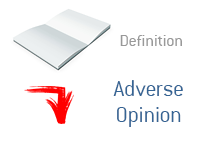Definition of Adverse Opinion
What is an "adverse opinion" as it applies to the world of finance? What is the definition of the term "adverse opinion"?
An "adverse opinion" is an opinion that is given by an auditor in which they state that a company's financial statements do not accurately represent the current state of the company's finances.
 According to the dictionary, "adverse" means "harmful" or "unfavorable", so it's never good if a company receives an "adverse opinion". An adverse opinion will usually result in a company needing to restate its earnings, which usually results in a sizable decline in a company's shares (if the company is publicly traded, that is).
According to the dictionary, "adverse" means "harmful" or "unfavorable", so it's never good if a company receives an "adverse opinion". An adverse opinion will usually result in a company needing to restate its earnings, which usually results in a sizable decline in a company's shares (if the company is publicly traded, that is). An "adverse opinion" can arise from something like an accountant's error, or an "adverse opinion" can arise due to something more sinister taking place, such as a company deliberately inflating their earnings in order to increase the value of the company. Neither situation is good news for a company, and both situations will likely result in angry shareholders.
If a company is forced to restate their earnings due to an "adverse opinion", share prices can drop dramatically over the course of just one day. There are past cases where shares of a company have dropped as much as 70% in one day due to restated earnings. Investor confidence in firms that need to restate earnings is usually shattered, sometimes permanently.
--
Davemanuel.com Articles That Mention Adverse Opinion:
None
